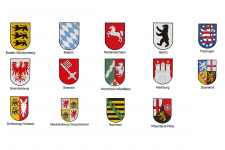
Germany is home to many minority languages still spoken by different ethnic communities across the country. These languages are an important part of Germany’s cultural heritage and identity. While German is the official language, minority languages are still spoken by various communities.
Low German or Plattdeutsch
Low German, also known as Plattdeutsch, is a West Germanic language spoken in northern Germany. It is primarily spoken in Schleswig-Holstein, Hamburg, Bremen, Lower Saxony, and Mecklenburg-Western Pomerania. Low German is one of the most widely spoken minority languages in Germany, with an estimated 2 million speakers.
Low German has a long history and has been used in literature, music, and theatre. It is also taught in schools in the northern regions of Germany. However, its usage has declined recently, particularly among younger generations.
Sorbian
Sorbian is a Slavic language that is spoken in eastern Germany, particularly in the state of Brandenburg. There are two varieties of Sorbian – Upper Sorbian and Lower Sorbian. Upper Sorbian has around 40,000 speakers, while Lower Sorbian has about 10,000.
Sorbian has a rich cultural heritage and is an integral part of the identity of the Sorbian people. It is used in literature, music, and theatre and is taught in schools in the Sorbian regions of Germany. However, the language is also declining, particularly among younger generations.
Danish
Danish is a North Germanic language that is spoken in northern Germany, particularly in the state of Schleswig-Holstein. While Danish is not an official language in Germany, it is still used by some regional communities. It is also the official language of Denmark and is spoken in Greenland and the Faroe Islands.
The use of Danish in Germany has declined over the years, mainly due to the integration of the Danish-speaking regions into the German state. However, efforts still exist to preserve the language and its cultural heritage.
Frisian
Frisian is a West Germanic language spoken in Schleswig-Holstein and the Frisian Islands. It is also spoken in the Netherlands. Frisian has three main dialects – West Frisian, Saterland Frisian, and North Frisian.
Frisian has a strong cultural identity and is an integral part of the heritage of the Frisian people. It is used in literature, music, and theatre and is taught in schools in the Frisian regions of Germany. Efforts are also being made to preserve and promote the language.
Romani
Romani is an Indo-Aryan language spoken by the Romani people in Germany and other countries. It has several dialects, each with its unique features and variations.
Romani has a long history and is an integral part of the cultural heritage of the Romani people. It is taught in schools in some Romani communities. However, the language is also declining, mainly due to discrimination and social exclusion.
Why are minority languages important?
Minority languages are important to a country’s cultural heritage and identity. They represent the diversity of the people who live in a country and are an important link to the past. They also help to create a sense of belonging and community among ethnic groups.
In addition, learning a minority language can have many benefits. It promotes empathy and understanding between different cultures and leads to a greater appreciation of diversity.

I found this article very interesting and it is sad to see that these languages are on the decline, mainly due to the younger generation not being interested in them. I live in Scotland but am originally from Northern Ireland where 50 to 60% of the population are of Scottish descent. Of these, the older generations, particularly in farming communities, still speak Ulster Scots. This is close to the language of our most famous poet, Robert Burns (1759 – 1796) from the western part of the Scottish lowlands (the part which borders with England). I was born and reared speaking pure Ulster Scots as was everybody else I knew. That has given me a very special bond with the region I came from and also the people from that region.
Ulster Scots has words and phrases which do not exist in English and invariably they define the culture, way of life and outlook of the people from that region. Unfortunately the education system in the UK told children, when I was at school in the 1950’s that those words and phrases are not “proper English” and should not be used. By doing this they greatly hastened the decline of this minority language. There are now attempts to save it, but, unfortunately, I feel that the decline is now terminal and with it dies a whole unique way life and expression.
Hey Jimmy, I have been wondering why I sometimes mix up people from Northern Ireland with Scottish people.